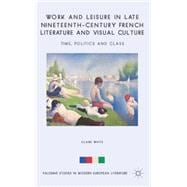The language of labour and leisure politics was burned onto the social consciousness in France by the Revolution, and it would remain critical to the ideals and conflicts at stake in future moments of upheaval. In the years following the Paris Commune, the mobilisation of the workforce and the struggle for labour reforms brought centre stage questions about time, politics and individual and collective rights. Claire White's account brings late nineteenth-century literature and art into conjunction with political discourses, philosophy and the social sciences to reveal how representations of work and leisure became the vehicle for class anxieties and utopian fantasies. More than topics of cultural history, this study shows how the terms and politics of labour and leisure were fundamental to artistic self-conceptions, affecting the ways in which writers and artists understood their own cultural work. Moving between fiction, poetry and painting, this study refocuses works by the canonical writers Émile Zola and Jules Laforgue, and the long-overlooked Neo-Impressionist painter Maximilien Luce.






